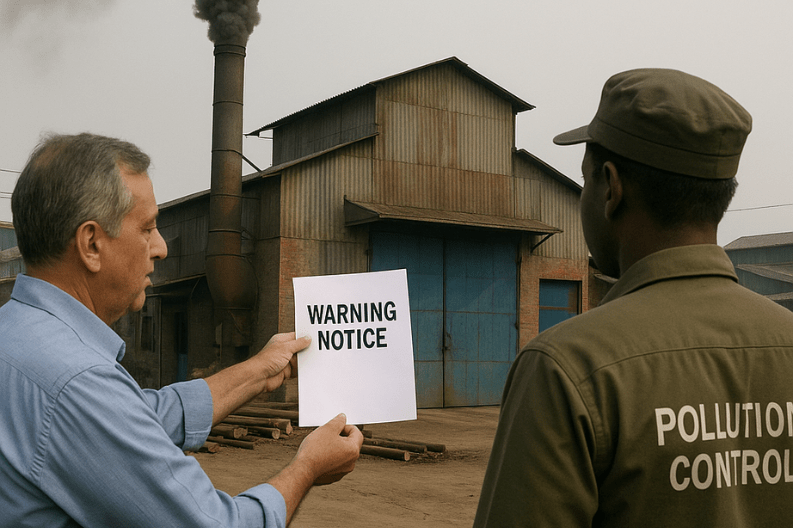The 10 Factories in Ghaziabad Are Warned after a surprise inspection by the Uttar Pradesh Pollution Control Board (UPPCB) in the Loni industrial area. Officials found several factories using wood as fuel, which is strictly banned under the Air (Prevention and Control of Pollution) Act, 1981. This law aims to protect air quality and safeguard public health.
The inspection team listed ten violators: M/s Malik Washing Plant, M/s Shahnawaz Washing Works, National Rubber Works, NK Washing, S Star Enterprises, Vanshika Dying, Apex Enterprises, Heera Prints, Fine Wash, and Balaji Industry. After the raid, officers sent a detailed report to the UPPCB headquarters in Lucknow, recommending strict action against them.
Using wood as fuel releases thick smoke and harmful particles, making the air dirtier. Therefore, the UPPCB has ordered all factories to switch to cleaner energy sources like CNG, LPG, or electricity. Repeated violations could result in heavy fines or even factory closures.
Meanwhile, Ghaziabad’s air quality has reached alarming levels. The city recorded an Air Quality Index (AQI) of 351 on Sunday and 340 on Monday, both in the “very poor” range. Breathing this air is risky, especially for children and senior citizens.
According to the Central Pollution Control Board (CPCB), all four monitoring stations in Ghaziabad reported “very poor” air on Monday.
- Vasundhara: AQI 370
- Loni: AQI 362
- Sanjay Nagar: AQI 321
- Indirapuram: AQI 305
In October, the city had nine days of “very poor” air and ten days of “poor” air quality. Clearly, this pattern shows that pollution control needs stronger enforcement and faster action.
To tackle this crisis, the Ghaziabad Municipal Corporation (GMC), Ghaziabad Development Authority (GDA), and Nagar Palika Parishad Loni have intensified cleaning efforts. The GMC now operates 18 anti-smog guns, 13 road sweepers, and 42 water sprinklers. The GDA added 4 anti-smog guns and 6 sprinklers, while Loni authorities run 2 anti-smog guns, 2 sweepers, and 9 sprinklers. Together, these tools help reduce dust and fine particles.
Doctors warn that long-term exposure to polluted air can cause asthma, bronchitis, heart disease, and even lung damage. Hence, health experts advise residents to wear masks, limit outdoor activities, and plant more trees.
Additionally, environmental groups have demanded tighter checks on industrial smoke and vehicle emissions. They also suggested creating a real-time air quality dashboard so residents can track pollution levels. Moreover, campaigns promoting electric vehicles and clean fuel could help reduce emissions in the long run.
Government officials confirmed that more inspections will soon take place in other industrial areas. The UPPCB plans to coordinate with the National Clean Air Programme (NCAP) to help Ghaziabad meet national air standards within the next few years.
In conclusion, the 10 factories in Ghaziabad are warned case shows the urgent need for collective action. With strict monitoring, public cooperation, and cleaner practices, Ghaziabad can move toward a healthier and safer future.



